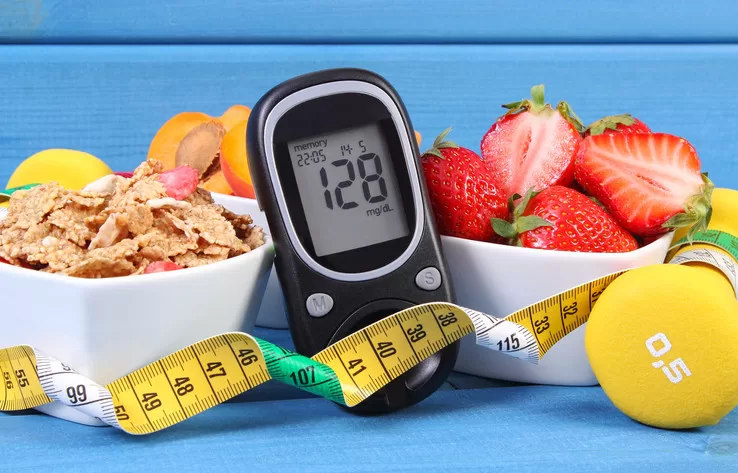Type 2 diabetes is more common than ever in our culture because of rising weight, inactivity, and aging trends. Deaths caused by diabetes in high-income countries went down between 2000 and 2010, went up between 2010 and 2016, and went up by 5% from 2000 to 2016. Recent figures for 2022 are still higher, rising rapidly to an alarming level. It’s especially scary because type 2 diabetes is now often found in kids who are overweight and don’t move around much.
It has long been understood that type 2 diabetes raises your risk of heart disease and stroke. More recent research has demonstrated that having diabetes raises your risk of developing dementia as well. But no one has looked into whether the age at which diabetes first shows up affects your chance of getting dementia.

how dementia can be caused by diabetes
Years of type 2 diabetes may cause dementia for a variety of reasons. One of them has to do with how diabetes affects the heart and how the health of the heart affects the health of the brain. Both heart disease and high blood pressure are linked to strokes, which can result in dementia. Strokes don’t seem to be the only cause of dementia, though. Other studies have shown that the risk of dementia goes up even when strokes are taken into account.
The frequent hypoglycemia episodes that accompany diabetes are another contributing cause. Even though it has been shown that tight control of blood sugar lowers the long-term risk of heart disease and strokes, tight control can also lead to low blood sugar, dementia, and memory loss. The hippocampus, the brain’s memory core, is known to be harmed by low blood sugar levels, which is probably why this is the case.
The idea that diabetes directly causes Alzheimer’s disease is among the more fascinating ones. Due to the same molecular and cellular characteristics as diabetes and Alzheimer’s disease, Alzheimer’s disease has even been referred to as “type 3 diabetes.” For instance, insulin is essential for the development of amyloid plaques, and it also contributes to tau phosphorylation, which results in neurofibrillary tangles. In other words, whereas insulin resistance in the body can result in type 2 diabetes, it can also cause Alzheimer’s disease-related plaques and tangles in the brain.
Dementia And Glycemic management
Glycemic management is crucial for preserving good brain function, whether you have Type 1 or Type 2 diabetes. In essence, this is yet another reason to have good self-control.
One of the seven lifestyle modifications people may make, known as the “Simple 7” by the American Heart Association, to support better heart and brain health is good blood glucose management. It’s a measure that might benefit the more than 34.2 million Americans who have diabetes.
According to a reliable source, type 2 diabetes, which also increases in prevalence as people age, affects the great majority of people with diabetes. It happens when the body can’t use insulin as well as it should keep blood sugar levels in check. It takes years to develop and is frequently linked to being overweight or obese. An autoimmune condition called type 1 diabetes causes the body to stop producing insulin.

Most research on the link between diabetes and dementia focuses on Type 2 diabetes, which, according to studies, roughly doubles the risk of dementia and may even cause it to show up a few years earlier. Since people with Type 1 diabetes are now living longer, scientists can now study how the disease affects their brains as they age.
Issues revealed by the Study on Dementia
According to a study, dementia risk increased for older people with Type 1 diabetes who were hospitalized for only one blood sugar extreme and increased by six times for those who were hospitalized for both highs and lows.
Although glucose only makes up 2% of the body’s weight, the brain consumes 20% to 30% of the blood’s circulating glucose. People don’t realize how much glucose is removed from the blood by the brain, which is a significant consumer of your glucose supply.
The brain can’t store extra glucose as other organs can. It is therefore susceptible to highs and lows. It needs it urgently and on-demand, but doing so puts the brain at excessive risk when blood glucose levels reach one extreme or another.
The rapid synthesis of beta-amyloid, which forms amyloid plaques in the brain when it clumps with other proteins, may be a result of too much glucose, according to research in mice. Alzheimer’s disease has been linked to beta-amyloid formation.
The brain’s rapid overproduction of beta-amyloid is like throwing a Jersey barrier out onto Interstate 95. The cars must all devise a way to avoid it. The cells don’t work as well because they can’t get where they need to go or talk to other cells in the right way.
On the other hand, too little glucose deprives the brain of the energy it needs to carry out tasks, according to her. You need the energy to talk, think, and button your shirt, among other things. The brain and cells require energy to be alive. Going too low makes the brain-hungry, which stops it from doing what it needs to do.
Good blood glucose control benefits the brain in ways other than just reducing the risk of dementia. Since the brain has a lot of blood vessels, it also helps keep strokes from happening. Good blood vessel health is correlated with good glucose control. Your brain benefits from what is beneficial for your heart.

Management Of Type 1 or Type 2 diabetes
Whether you have Type 1 or Type 2 diabetes, there are a number of things you can do to keep your blood sugar stable.
It’s crucial to first understand your numbers. Prediabetes is a condition that is marked by slightly higher blood sugar levels. Even before it gets worse, it can hurt you. If your levels are less than 100 mg/dl, you are healthy. If your levels are between 100 and 125 mg/dl, you have prediabetes.
There are signs you are becoming ill if you are in that area. A person might smoke, consume a poor diet, be overweight, or not get enough sleep or exercise. “You use that excess glucose during exercise.”
Medication can be required if diet and exercise are insufficient. Because what they eat and how much exercise they do can cause levels to rise or fall, people with type 1 diabetes need to monitor their blood sugar levels frequently throughout the day. Health professionals advise people to carry supplies like hard candy, fruit juice, or glucose pills with them to help raise levels if they go too low.
Researchers need to work on more ways to make sure that people with type 1 diabetes live long, healthy lives. “We must take a step back and consider how to improve the prospects of successful aging in this patient population.”
The following seven healthy lifestyle adjustments are necessary to fight dementia:
- 1. Should stop smoking
- 2. Consistent social interaction
- A healthy diet with more fish, fruits, and vegetables and less refined grains, processed meats, and unprocessed meats.
- Moderate alcohol use of up to two drinks per day for men and one drink per day for women
- Regularly engaging in 75 minutes of strenuous exercise or at least 2.5 hours of moderate exercise per week
- A daily sleep cycle of seven to nine hours
- Avoiding excessive sitting at one place
lower your risk of developing diabetes and dementia Through Lifestyle Changes
The good news is that you can lower both your risk of dementia and type 2 diabetes. Consult your doctor straight away to see if you should make any of the following lifestyle changes. Be aware that these lifestyle adjustments are beneficial even if you have been given diabetes or prediabetes diagnosis.
- Spend at least 30 minutes every day, five days per week, exercising aerobically.
- Consume a Mediterranean-inspired diet.
- Keep your weight within a healthy range.
- Lower your blood pressure.
- Eat fewer high-cholesterol foods to lower your cholesterol.
Lastly, you can reduce your chance of getting dementia by being social, keeping a positive attitude, learning new things, and listening to music.
How to alter your lifestyle to prevent dementia
Developing a sense of meaning or purpose in life can bring about great change because it gives you a reason to wake up and work toward a better future.

- Regularly visiting a therapist: You can learn how to change your habits and tendencies by investing in your awareness of them.
- Join a gym, a walking club, a group for female entrepreneurs, etc. to find people who will inspire you. You will be propelled by this type of community when you lack inspiration. This is by far a good way to stop smoking, eat more healthy foods, or get more exercise.
- Set manageable targets within larger ones: Smaller goals like decreasing weight or quitting smoking might include activities like walking, talking to a mentor once a week, and drinking water instead of smoking.
- Gratify yourself by living your life to the fullest. We all enjoy receiving praise for a job well done, and creating an internal system of rewards may be the best way to keep working toward your goals.
- Develop compassion for yourself: Being kind to yourself has both mental and physical benefits that make us healthier and help us get along better with other people.
The connection between dementia, diabetes, and sleep
The American Psychological Association says that not getting enough sleep makes it harder to treat any mental illness and raises the risk of diabetes, high blood pressure, obesity, heart disease, depression, and other health problems.
So, experts say that good sleep health is the base from which all of the other good living habits listed above grow. Other health goals are more challenging to reach when you aren’t getting enough sleep since your brain isn’t rested.
According to research doctors and senior practitioners, patients with type 2 diabetes must get the recommended 7 to 9 hours of sleep per night.
They claim that “poor sleep and/or lack of sleep causes increased insulin resistance.” You also feel more hungry and full, and you want sweet and fatty foods more. This can make it more difficult for those with type 2 diabetes to maintain healthy blood sugar levels.
When you are in deep sleep, your brain effectively functions as a dishwasher, washing away the waste materials, such as plaques and protein clusters, that accumulate from being awake during the day. Doctors stressed that your brain can’t do this cleaning process if you don’t get enough sleep, which could lead to plaque buildup.
How to begin altering your sleeping patterns
A study indicates that you should try to increase your total sleep duration by 30 to 60 minutes once a week if you have trouble finding time to sleep but have no problems sleeping once you get into bed.
Then, she continues, “after that’s better, proceed to two days a week, and so on.” Another strategy is to try to go to bed a few minutes earlier each night for the first week, and once that works, raise it to 15 minutes each night.
If you are unable to find out time to sleep, you should try to figure out why you don’t make time to sleep.
You should consider the following inquiries:
- Is it delaying the completion of specific tasks?
- Is it finally getting some me time?
- What makes you think you need to sleep more?
- Additional sleep-related advice
- Using timers to help you remember to wind down for bed at a certain time each night is recommended. When the timer goes off on your phone, write your “why” on the screen.
Further, the doctor advises limiting automatic play on streaming media apps as well. It won’t automatically switch from one show to another, and you’ll have to decide whether or not to watch another one. For your own good cut the time watching binge programs or live streaming programs and read a good book instead.

People who have difficulty sleeping and staying asleep should examine their sleep hygiene. This entails avoiding alcohol and caffeine three hours before bed, as well as screens an hour to an hour and a half before bed.
As there are numerous efficient non-medication and pharmaceutical therapies available, speak with a sleep specialist if those measures are insufficient and you continue to suffer with sleep quantity and quality.
Disclaimer: This information is for educational purposes only, and no medical advice should be inferred from it. Before changing your diet or adding supplements, please talk to your doctor.
The author’s views are his or her own. The facts and opinions in the article have been taken from various articles and commentaries available in the online media and Eastside Writers does not take any responsibility or obligation for them.
Note: Contact our Writers at www.eastsidewriters.com for writing Blogs/Articles on any niche. We have experts in various domains from Technology to Finance and from Spirituality to Lifestyle and Entertainment.
Originally posted 2022-12-17 13:34:06.







Pingback: Probiotics and Prebiotics- The Secrets Of Gut Health Revealed
Diabetes patients must read this amazing article! Great information thanks for sharing Mr. Partho Gosh, you are a amazing writer keep sharing amazing information.
Pingback: Is Constant Sitting Slowly And Steadily Killing You - Eastside Writers
Pingback: Two Proven techniques to get rid of stubborn belly fat - Eastside Writers
Pingback: 12 Reasons Avocados Is Necessary To Maintain Health
Pingback: Ayurveda Teaches How To Love Your Liver And Stay Healthy
Pingback: Boost Your Blood Circulations To Counter Health Issues - Eastside Writers
Pingback: Atherosclerosis-Its Natural Remedies And Prevention Through Herbs And Supplements - Eastside Writers
Pingback: Amazing Benefits Of Drumsticks Form Treating Respiratory Illness To Lowering Blood Sugar - Eastside Writers
Pingback: 11 Foods Rich In Antioxidants That Demonstrate Huge Health Benefits - Eastside Writers
Pingback: Know The Rich Benefits Of Adding Dark Chocolate To Your Diet Routine - Eastside Writers
Pingback: Wholesome Benefits Of Kutki Can Make You Live A Longer Healthy Life
Pingback: Avoid These Food That Spike Your Blood Sugar Considerably & Harm You
Pingback: Useful Facts About Rice Grain That You Should Know If Consuming Regularly - Eastside Writers
Pingback: The Benefits and Risks of Lemongrass: A Comprehensive Guide - Eastside Writers
Pingback: Breathe Your Way to Enlightenment: Discovering Inner Potential - Eastside Writers